2016年春九年级英语Unit 12 Life is full of the unexpected 课件Section B 2
- 格式:ppt
- 大小:1.55 MB
- 文档页数:26
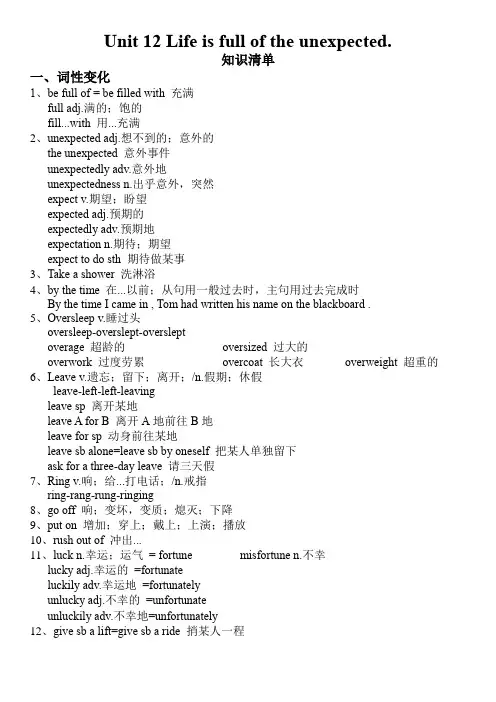
Unit 12 Life is full of the unexpected.知识清单一、词性变化1、be full of = be filled with 充满full adj.满的;饱的fill...with 用...充满2、unexpected adj.想不到的;意外的the unexpected 意外事件unexpectedly adv.意外地unexpectedness n.出乎意外,突然expect v.期望;盼望expected adj.预期的expectedly adv.预期地expectation n.期待;期望expect to do sth 期待做某事3、Take a shower 洗淋浴4、by the time 在...以前;从句用一般过去时,主句用过去完成时By the time I came in , Tom had written his name on the blackboard .5、Oversleep v.睡过头oversleep-overslept-oversleptoverage 超龄的oversized 过大的overwork 过度劳累overcoat 长大衣overweight 超重的6、Leave v.遗忘;留下;离开;/n.假期;休假leave-left-left-leavingleave sp 离开某地leave A for B 离开A地前往B地leave for sp 动身前往某地leave sb alone=leave sb by oneself 把某人单独留下ask for a three-day leave 请三天假7、Ring v.响;给...打电话;/n.戒指ring-rang-rung-ringing8、go off 响;变坏,变质;熄灭;下降9、put on 增加;穿上;戴上;上演;播放10、rush out of 冲出...11、luck n.幸运;运气= fortune misfortune n.不幸lucky adj.幸运的=fortunateluckily adv.幸运地=fortunatelyunlucky adj.不幸的=unfortunateunluckily adv.不幸地=unfortunately12、give sb a lift=give sb a ride 捎某人一程give sb a chance 给某人一个机会give sb a hand 帮某人一把give sb a hug 拥抱某人give sb a call/ring 给某人打电话13、end up 结束,告终end up doing sth 最终成为,最终处于14、the+adj 表示一类人或事物the poor 穷人the disabled 残疾人the young 年轻人the homeless 无家可归的the old 老年人the sick 病人15、be about to sth 刚要做某事;即将做某事be about to do sth 刚要做某事16、decide to do sth 决定做某事=make a decision to do sth17、wait in line with sb 与某人一起排队等候wait in line 排队等候=stand in linecut in line 插队in line with 与...成一排18、Stare v./n.盯着看;凝视;/凝视;注视stare at 凝视;盯着看19、disbelief n.不信;怀疑(不可数)belief n.信仰in disbelief 怀疑地;难以置信地20、above 在...上面(不接触,不垂直)belowover 在...正上方(不接触,垂直)underon 在...上面(表面接触)beneath21、burning adj.着火的;燃烧的burned adj.燃烧过的;烧完的burn v./n.着火;燃烧;/烧伤22、alive adj.活着的,在世的(侧重生死界限)living adj.活着的live adj.活的,有生命的,实况转播的lively adj.活泼的lovely adj.可爱的23、Till=until 到;直到短暂动词+not...till/until 直到...才持续性动词+until 到...为止24、turn into 变成... = change intoturn...into 把...变成25、west adj.向西的;西部的;adv.向西;朝西;n.西;西方western adj.西方的westerner n.西方人in the west 在西方the west of ...的西部26、forget to do sth 忘记要做某事(未做)forget doing sth 忘记做了某事(已做)27、chance n.机会=opportunityget a chance to do sth 得到机会做某事have a chance to do sth= have a chance of doing sth 有做...的机会take the chance 把握机会miss a chance 失去机会by chance 碰巧28、Show up 露面show off 炫耀show sb around 带领某人参观29、Fool v./n.愚弄;/傻瓜foolish adj.愚蠢的=stupid=silly30、get dressed 穿好衣服be dressed in 穿着31、invite v.邀请invitation n.邀请invite sb to do sth 邀请某人做某事32、embarrassed adj.窘迫的;害羞的(人)Embarrassing adj.令人窘迫的;令人害羞的(物)embarrassment n.害羞33、empty adj.空的34、Realize v.意识到;实现realization n.实现realize one’s dream = achieve one’s dream=one’s dream comes true 实现某人的梦想35、Stay up 熬夜put up 张贴hurry up 快点wake up 醒来call up 打电话dress up 化妆pick up捡起set up建立show up 出现;露面look up 查阅make up 编造give up放弃end up结束36、Sth happen(s)to sb 某人发生某事happen to do sth 碰巧做某事37、April Fool’s Day 愚人节38、Celebration n.庆祝;庆典celebrate v.庆祝celebrated adj.著名的=famous39、Take place 举行;发生40、Play tricks/jokes on sb 捉弄某人/开某人的玩笑=play a trick/joke on sbtrick v./n.欺骗;/花招41、reporter n.记者report v./n.作报告;/报告42、announce v.宣布;通知announcement n.通知43、stop doing sth 停止做某事stop to do sth 停下来去做另一件事44、no more = no longer = not any more = not any longer 不再45、as...as sb can/could 某人尽可能=as...as possiblemuch+不可数名词many+复数名词46、Hoax n.骗局;恶作剧47、sell out 卖光48、discovery n.发现discover v.发现49、lose weight 减肥50、customer n.顾客51、End up doing sth 以做某事而结束52、marry sb 嫁/娶某人get married 结婚=be married53、cancel v.取消cancel - canceled/cancelled - canceled/cancelled54、on one’s radio program 通过...主持的电台节目55、alien n.外星人56、Mars n.火星57、land on the earth 在地球着陆58、officer n.官员(政府);军官official adj.官方的;n.高级职员office n.办公室59、sb run out of sth用完;耗尽sth run out 用完;耗尽60、believable adj.可相信的;可信任的unbelievable adj.难以置信的believe v.相信belief n.信仰61、disappear v.消失disappear into 消失在...中disappearance n.消失;不见appear v.出现appearance n.出现;外表。
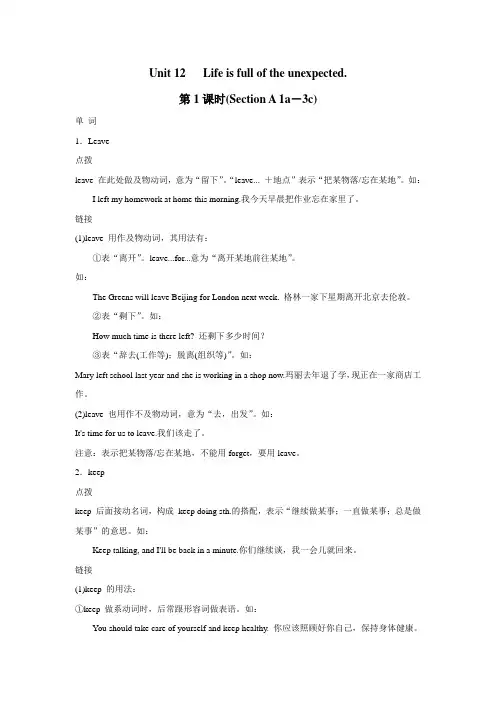
Unit 12 Life is full of the unexpected.第1课时(Section A 1a-3c)单词1.Leave点拨leave 在此处做及物动词,意为“留下”。
“leave... +地点”表示“把某物落/忘在某地”。
如:I left my homework at home this morning.我今天早晨把作业忘在家里了。
链接(1)leave 用作及物动词,其用法有:①表“离开”。
leave...for...意为“离开某地前往某地”。
如:The Greens will leave Beijing for London next week. 格林一家下星期离开北京去伦敦。
②表“剩下”。
如:How much time is there left? 还剩下多少时间?③表“辞去(工作等);脱离(组织等)”。
如:Mary left school last year and she is working in a shop now.玛丽去年退了学,现正在一家商店工作。
(2)leave 也用作不及物动词,意为“去,出发”。
如:It's time for us to leave.我们该走了。
注意:表示把某物落/忘在某地,不能用forget,要用leave。
2.keep点拨keep 后面接动名词,构成keep doing sth.的搭配,表示“继续做某事;一直做某事;总是做某事”的意思。
如:Keep talking, and I'll be back in a minute.你们继续谈,我一会儿就回来。
链接(1)keep 的用法:①keep 做系动词时,后常跟形容词做表语。
如:You should take care of yourself and keep healthy. 你应该照顾好你自己,保持身体健康。
②英语中keep 常用“keep+名词/代词+过去分词/现在分词/形容词/副词/介词短语”的结构来表示“使……保持某一状态”。
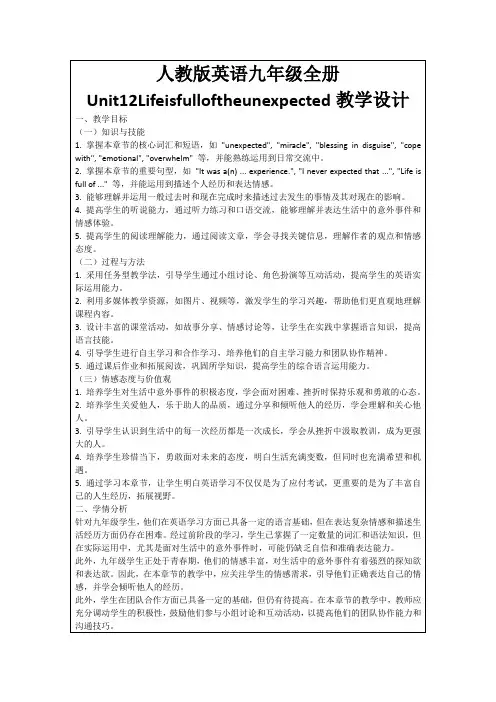
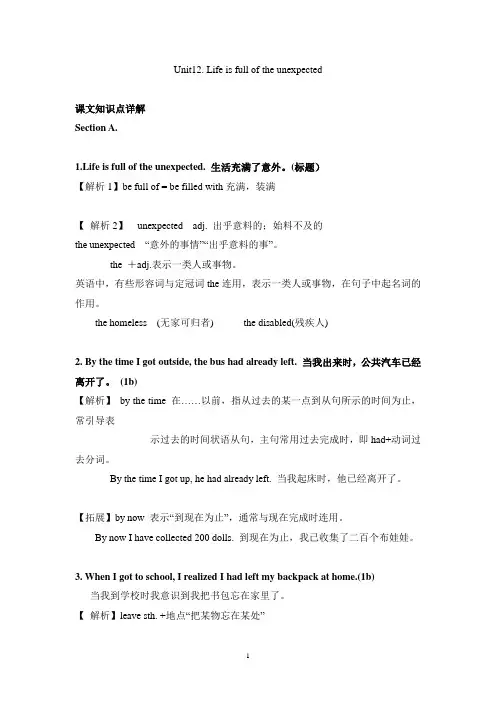
Unit12. Life is full of the unexpected课文知识点详解Section A.1.Life is full of the unexpected. 生活充满了意外。
(标题)【解析1】be full of = be filled with充满,装满【解析2】unexpected adj. 出乎意料的;始料不及的the unexpected “意外的事情”“出乎意料的事”。
the +adj.表示一类人或事物。
英语中,有些形容词与定冠词the连用,表示一类人或事物,在句子中起名词的作用。
the homeless (无家可归者) the disabled(残疾人)2. By the time I got outside, the bus had already left. 当我出来时,公共汽车已经离开了。
(1b)【解析】by the time 在……以前,指从过去的某一点到从句所示的时间为止,常引导表示过去的时间状语从句,主句常用过去完成时,即had+动词过去分词。
By the time I got up, he had already left. 当我起床时,他已经离开了。
【拓展】by now 表示“到现在为止”,通常与现在完成时连用。
By now I have collected 200 dolls. 到现在为止,我已收集了二百个布娃娃。
3. When I got to school, I realized I had left my backpack at home.(1b)当我到学校时我意识到我把书包忘在家里了。
【解析】leave sth. +地点“把某物忘在某处”forget意为“遗忘某物”,指忘记一件具体的东西,但不能有具体的地点。
I left my book on the desk. 我把书忘在了桌子上。
I forgot my umbrella yesterday .我昨天忘了带伞。
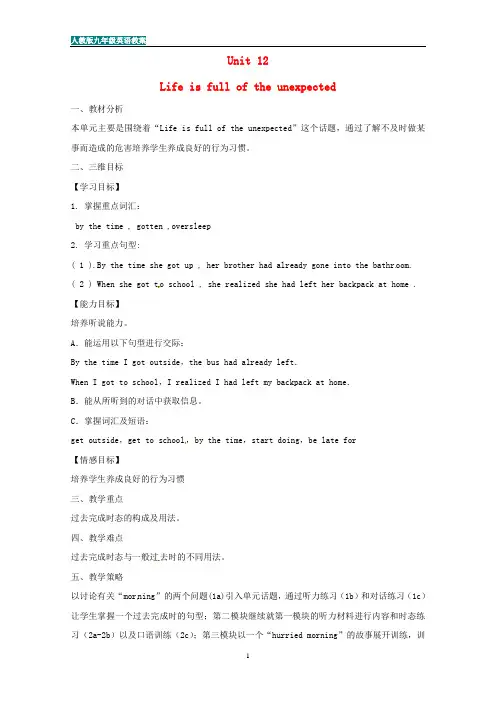
Unit 12Life is full of the unexpected一、教材分析本单元主要是围绕着“Life is full of the unexpected”这个话题,通过了解不及时做某事而造成的危害培养学生养成良好的行为习惯。
二、三维目标【学习目标】1. 掌握重点词汇:by the time , gotten ,oversleep2. 学习重点句型:( 1 ).By the time she got up , her brother had already gone into the bathr oom. ( 2 ) When she got t o school , she realized she had left her backpack at home . 【能力目标】培养听说能力。
A.能运用以下句型进行交际:By the time I got outside,the bus had already left.When I got to school,I realized I had left my backpack at home.B.能从所听到的对话中获取信息。
C.掌握词汇及短语:get outside,get to school,by the time,start doing,be late for【情感目标】培养学生养成良好的行为习惯三、教学重点过去完成时态的构成及用法。
四、教学难点过去完成时态与一般过去时的不同用法。
五、教学策略以讨论有关“mor ning”的两个问题(1a)引入单元话题,通过听力练习(1b)和对话练习(1c)让学生掌握一个过去完成时的句型;第二模块继续就第一模块的听力材料进行内容和时态练习(2a-2b)以及口语训练(2c);第三模块以一个“hurried morning”的故事展开训练,训练形式为阅读排序(3a)和回答问题(3b)以及口语练习(3c)。
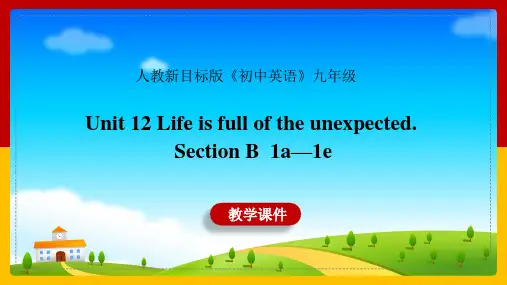
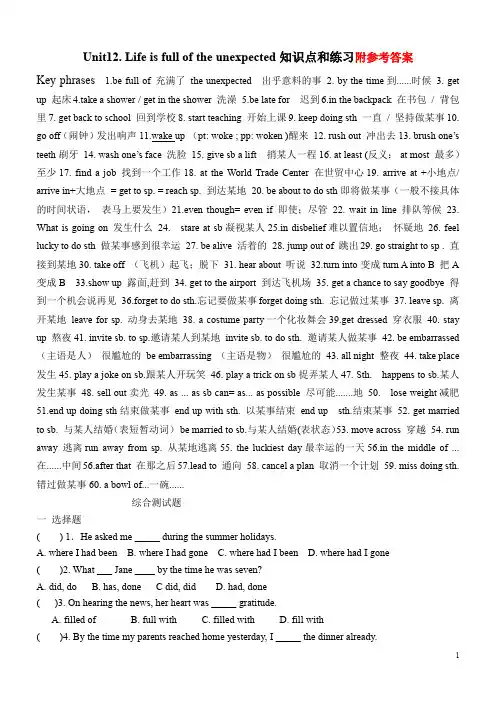
Unit12. Life is full of the unexpected知识点和练习附参考答案Key phrases 1.be full of 充满了the unexpected 出乎意料的事2. by the time到......时候3. get up 起床4.take a shower / get in the shower 洗澡5.be late for 迟到6.in the backpack 在书包/ 背包里7. get back to school 回到学校8. start teaching 开始上课9. keep doing sth 一直/ 坚持做某事10. go off(闹钟)发出响声11.wake up (pt: woke ; pp: woken )醒来12. rush out 冲出去13. brush one’s teeth刷牙14. wash one’s face 洗脸15. give sb a lift 捎某人一程16. at least (反义:at most 最多)至少17. find a job 找到一个工作18. at the World Trade Center 在世贸中心19. arrive at +小地点/ arrive in+大地点= get to sp. = reach sp. 到达某地20. be about to do sth即将做某事(一般不接具体的时间状语,表马上要发生)21.even though= even if 即使;尽管22. wait in line 排队等候23. What is going on 发生什么24. stare at sb凝视某人25.in disbelief难以置信地;怀疑地26. feel lucky to do sth 做某事感到很幸运27. be alive 活着的28. jump out of 跳出29. go straight to sp . 直接到某地30. take off (飞机)起飞;脱下31. hear about 听说32.turn into变成turn A into B 把A 变成B 33.show up 露面,赶到34. get to the airport 到达飞机场35. get a chance to say goodbye 得到一个机会说再见36.forget to do sth.忘记要做某事forget doing sth. 忘记做过某事37. leave sp. 离开某地leave for sp. 动身去某地38. a costume party一个化妆舞会39.get dressed 穿衣服40. stay up 熬夜41. invite sb. to sp.邀请某人到某地invite sb. to do sth. 邀请某人做某事42. be embarrassed (主语是人)很尴尬的be embarrassing (主语是物)很尴尬的43. all night 整夜44. take place 发生45. play a joke on sb.跟某人开玩笑46. play a trick on sb捉弄某人47. Sth. happens to sb.某人发生某事48. sell out卖光49. as ... as sb can= as... as possible 尽可能.......地50. lose weight减肥51.end up doing sth结束做某事end up with sth. 以某事结束end up sth.结束某事52. get married to sb. 与某人结婚(表短暂动词)be married to sb.与某人结婚(表状态)53. move across 穿越54. run away 逃离run away from sp. 从某地逃离55. the luckiest day最幸运的一天56.in the middle of ...在......中间56.after that 在那之后57.lead to 通向58. cancel a plan 取消一个计划59. miss doing sth. 错过做某事60. a bowl of...一碗......综合测试题一选择题( ) 1.He asked me _____ during the summer holidays.A. where I had beenB. where I had goneC. where had I beenD. where had I gone( )2. What ___ Jane ____ by the time he was seven?A.did, doB. has, done C did, did D. had, done( )3. On hearing the news, her heart was _____ gratitude.A.filled ofB. full withC. filled withD. fill with( )4. By the time my parents reached home yesterday, I _____ the dinner already.A had cooked B. cooked C. have cooked D. was cooked.( ) 5. —I’m sorry I ________ my exercise book at home this morning.—It doesn’t mater. Don’t forget ________ it here this afternoon.A. left; to bringB. forgot; bringingC. have left; to bringD. have forgot; to bring( )6. She said she __________ the principle alreadyA .has seen B. saw C. will see D. had seen( )7. She said her family _____ themselves ______ the army during the war.A. has hidden, fromB. had hidden, fromC. has hidden, withD. had hidden, with( ) 8. Hurry up, Tom! The train is _____ to start.A. aboutB. withC. forD. At( ) 9. On those foggy days,you could hardly see anything around you ___ it was at noon.A.soB.becauseC.butD.though( )10. Jin Yong is one of the greatest and oldest___writer. He is still ____.A. living; aliveB. living; livingC. alive; livingD. alive; lively( ) 11. As the road to the airport is under repair, we will have to ____ early to get there in time.A.turn offB.take offC.put offD.set off( ) 12. Sam enjoyed collecting. He has collected over three _______stamps and _______ coins.A.hundred, hundred ofB. hundred of , hundredsC. hundred of , hundredD. hundred, hundreds of ( ) 13. -The advertisement says there will be a great celebration this Sunday.-Forget it, it’s a ________.A. foolB. hoaxC. pleasureD. risk( ) 14. She had written a number of books ______ the end of last year.A. forB. inC. byD. at( )15. —I wore sports shoes to the ball yesterday evening by mistake!— Oh, dear, you must be very ____ at the ball!A. embarrassedB. satisfiedC. tiredD. Surprised二完形填空When I was about six years old, my brother David and I visited our aunt, Mary. We stayed in her house for a night. David was only 4 years old, and was still 16 of the dark, so Mary left the hall light on when we slept.However, David 17 the grey moths(蛾) flying around the hall light. He asked Mary to make the moths go away. When she asked 18 , she simply said, “Because they are ugly and scary, I don’t like them.” Mary laughed and said, “Being ugly outside doesn’t 19 not being beautiful inside. In fact, moths are one of the most beautiful animals in the animal world.“Once, the angels (天使) were 20 . They were sad because it was raining heavily. The 21 little moths hated to see others so sad. They decided to make a rainbow(彩虹) to cheer up the angels.They thought if the butterflies(蝴蝶) 22 , they could make a beautiful rainbow together.“Then one of the moths went to ask the butterflies for help. Bu t the butterflies didn’t want to 23 any of their colors, so the moths decided to make a rainbow themselves. They beat their wings very hard and the colors on them made a rainbow. They kept giving a little more and a little more 24 the rainbow went across the sky. They had given away all their colors except grey, which didn’t matc h the beautiful rainbow.“Then the once-colorful moths became 25 . The angles saw the rainbow and smiled…” My brother went to sleep with that story and hasn’t feared months since then.()16. A. afraid B. sure C. proud D. happy()17. A. liked B. hated C. let D. killed()18. A. how B. what C. when D. why()19. A. mean B. make C. know D. hope()20. A. laughing B. playing C. crying D. talking()21. A. kind B. angry C. ugly D. sad()22. A. refused B. advised C. helped D. left()23. A. give up B. pick up C. turn up D. look up()24. A. unless B. until C. after D. since()25. A. red B. yellow C. green D. grey三用动词的适当形式填空。
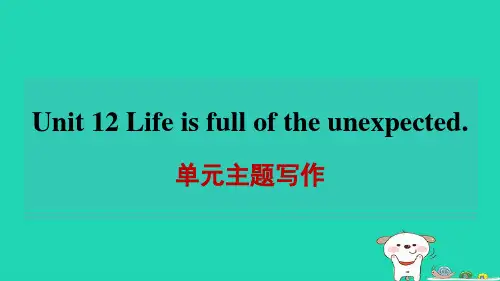
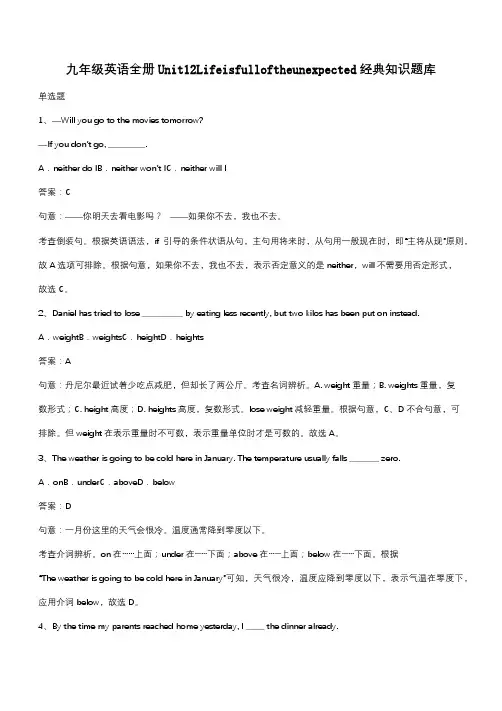
九年级英语全册Unit12Lifeisfulloftheunexpected经典知识题库单选题1、—Will you go to the movies tomorrow?—If you don’t go, __________.A.neither do IB.neither won’t IC.neither will I答案:C句意:——你明天去看电影吗?——如果你不去,我也不去。
考查倒装句。
根据英语语法,if引导的条件状语从句,主句用将来时,从句用一般现在时,即“主将从现”原则,故A选项可排除。
根据句意,如果你不去,我也不去,表示否定意义的是neither,will不需要用否定形式,故选C。
2、Daniel has tried to lose ___________ by eating less recently, but two kilos has been put on instead. A.weightB.weightsC.heightD.heights答案:A句意:丹尼尔最近试着少吃点减肥,但却长了两公斤。
考查名词辨析。
A. weight重量;B. weights重量,复数形式;C. height高度;D. heights高度,复数形式。
lose weight减轻重量。
根据句意,C、D不合句意,可排除。
但weight在表示重量时不可数,表示重量单位时才是可数的。
故选A。
3、The weather is going to be cold here in January. The temperature usually falls ________ zero. A.onB.underC.aboveD.below答案:D句意:一月份这里的天气会很冷。
温度通常降到零度以下。
考查介词辨析。
on在……上面;under在……下面;above在……上面;below在……下面。
根据“The weather is going to be cold here in January”可知,天气很冷,温度应降到零度以下,表示气温在零度下,应用介词below,故选D。
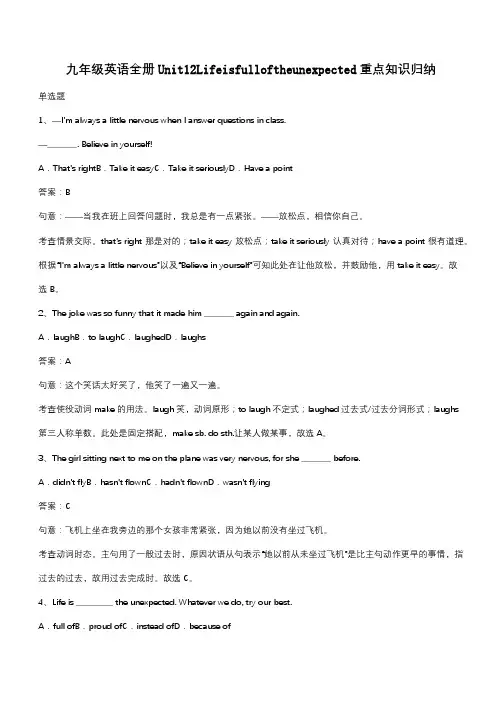
九年级英语全册Unit12Lifeisfulloftheunexpected重点知识归纳单选题1、—I'm always a little nervous when I answer questions in class.—________. Believe in yourself!A.That's rightB.Take it easyC.Take it seriouslyD.Have a point答案:B句意:——当我在班上回答问题时,我总是有一点紧张。
——放松点,相信你自己。
考查情景交际。
that’s right那是对的;take it easy放松点;take it seriously认真对待;have a point很有道理。
根据“I'm always a little nervous”以及“Believe in yourself”可知此处在让他放松,并鼓励他,用take it easy。
故选B。
2、The joke was so funny that it made him ________ again and again.A.laughB.to laughC.laughedD.laughs答案:A句意:这个笑话太好笑了,他笑了一遍又一遍。
考查使役动词make的用法。
laugh笑,动词原形;to laugh不定式;laughed过去式/过去分词形式;laughs第三人称单数。
此处是固定搭配,make sb. do sth.让某人做某事,故选A。
3、The girl sitting next to me on the plane was very nervous, for she ________ before.A.didn’t flyB.hasn’t flownC.hadn’t flownD.wasn’t flying答案:C句意:飞机上坐在我旁边的那个女孩非常紧张,因为她以前没有坐过飞机。
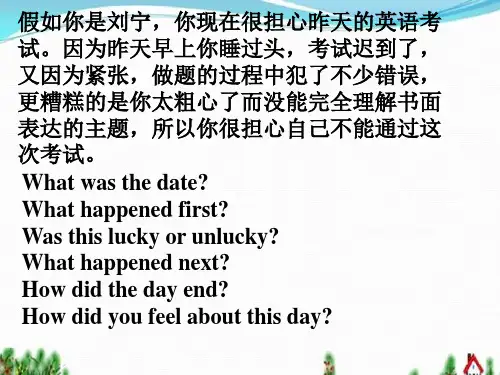
Unit12. Life is full of the unexpected课文知识点详解Section A.1.Life is full of the unexpected. 生活充满了意外。
(标题)【解析1】be full of = be filled with充满,装满【解析2】unexpected adj. 出乎意料的;始料不及的the unexpected ―意外的事情‖―出乎意料的事‖。
the +adj.表示一类人或事物。
英语中,有些形容词与定冠词the连用,表示一类人或事物,在句子中起名词的作用。
the homeless (无家可归者) the disabled(残疾人)2. By the time I got outside, the bus had already left. 当我出来时,公共汽车已经离开了。
(1b)【解析】by the time 在……以前,指从过去的某一点到从句所示的时间为止,常引导表示过去的时间状语从句,主句常用过去完成时,即had+动词过去分词。
By the time I got up, he had already left. 当我起床时,他已经离开了。
【拓展】by now 表示―到现在为止‖,通常与现在完成时连用。
By now I have collected 200 dolls. 到现在为止,我已收集了二百个布娃娃。
3. When I got to school, I realized I had left my backpack at home.(1b)当我到学校时我意识到我把书包忘在家里了。
【解析】leave sth. +地点―把某物忘在某处‖forget意为―遗忘某物‖,指忘记一件具体的东西,但不能有具体的地点。
I left my book on the desk. 我把书忘在了桌子上。
I forgot my umbrella yesterday .我昨天忘了带伞。